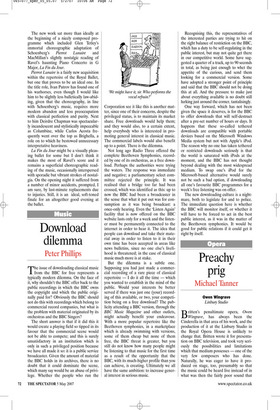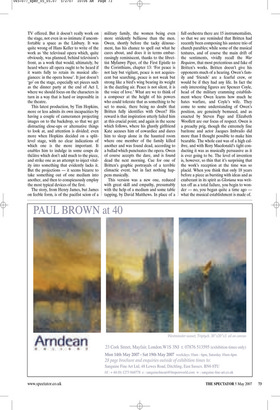Preachy prig
Michael Tanner
Owen Wingrave Linbury Studio
Britten’s penultimate opera, Owen Wingrave, has always been the Cinderella in that area of his work, and the production of it at the Linbury Studio in the Royal Opera House is unlikely to change that. Britten wrote it for presentation on BBC television, and took very seriously the possibilities and limitations which that medium possesses — one of the very few composers who has done. Naturally, he was eager to have it produced on stage, too, presumably so that the music could be heard live instead of in what was then the fairly poor sound that TV offered. But it doesn’t really work on the stage, not even in so intimate if uncomfortable a space as the Linbury. It was quite wrong of Hans Keller to write of the work as ‘the televisual opera which, quite obviously, was planned, behind television’s front, as a work that would, ultimately, be heard where all opera ought to be heard if it wants fully to retain its musical allegiances: in the opera house’. It just doesn’t ‘go’ on the stage, especially set pieces such as the dinner party at the end of Act I, where we should focus on the characters in turn in a way that is hard or impossible in the theatre.
This latest production, by Tim Hopkins, more or less admits its own incapacities by having a couple of cameramen projecting images on to the backdrop, so that we get distracting close-ups or alternative things to look at, and attention is divided; even more when Hopkins decided on a splitlevel stage, with no clear indications of which one is the more important. It enables him to indulge in some coups de théâtre which don’t add much to the piece, and strike one as an attempt to inject vitality into something that evidently lacks it. But the projections — it seems bizarre to take something out of one medium into another, and then to conspicuously employ the most typical devices of the first.
The story, from Henry James, but James on feeble form, is of the pacifist scion of a military family, the women being even more stridently bellicose than the men. Owen, shortly before the tacky dénouement, has his chance to spell out what he cares about, and does it in terms embarrassingly reminiscent, thanks to the librettist Myfanwy Piper, of the First Epistle to the Corinthians, chapter 13: ‘For peace is not lazy but vigilant, peace is not acquiescent but searching, peace is not weak but strong like a bird’s wing bearing its weight in the dazzling air. Peace is not silent, it is the voice of love.’ What are we to think of a composer at the height of his powers who could tolerate that as something to be set to music, there being no doubt that Britten fully identifies with Owen? His reward is that inspiration utterly failed him at this crucial point; and again in the scene which follows, where his ghastly girlfriend Kate accuses him of cowardice and dares him to sleep alone in the haunted room where one member of the family killed another and was found dead, according to a ballad which punctuates the opera. Owen of course accepts the dare, and is found dead the next morning. Cue for one of Britten’s graphic portrayals of a terrible climactic event, but in fact nothing happens musically.
This version was a new one, reduced with great skill and empathy, presumably with the help of a medium and some table tapping, by David Matthews. In place of a full orchestra there are 15 instrumentalists, so that we are reminded that Britten had recently been composing his austere trio of church parables; while some of the musical textures, and of course the main drift of the sentiments, vividly recall the War Requiem, that most pretentious and fake of Britten’s works. Britten doesn’t give his opponents much of a hearing. Owen’s family and ‘friends’ are a fearful crew, or would be if they had any life. In fact the only interesting figures are Spencer Coyle, head of the military cramming establishment where Owen learns how much he hates warfare, and Coyle’s wife. They come to some understanding of Owen’s position, are genuinely bemused, and as enacted by Steven Page and Elizabeth Woollett are our focus of respect. Owen is a preachy prig, though the extremely fine baritone and actor Jacques Imbrailo did more than I thought possible to make him bearable. The whole cast was of a high calibre, and with Rory Macdonald’s tight conducting it was as musically persuasive as it is ever going to be. The level of invention is, however, so thin that it’s surprising that the work’s reception at the time was so placid. When you think that only 18 years before a piece as bursting with ideas and as exuberant in its spirit as Gloriana was written off as a total failure, you begin to wonder — no, you began quite a time ago what the musical establishment is made of.



































































































 Previous page
Previous page